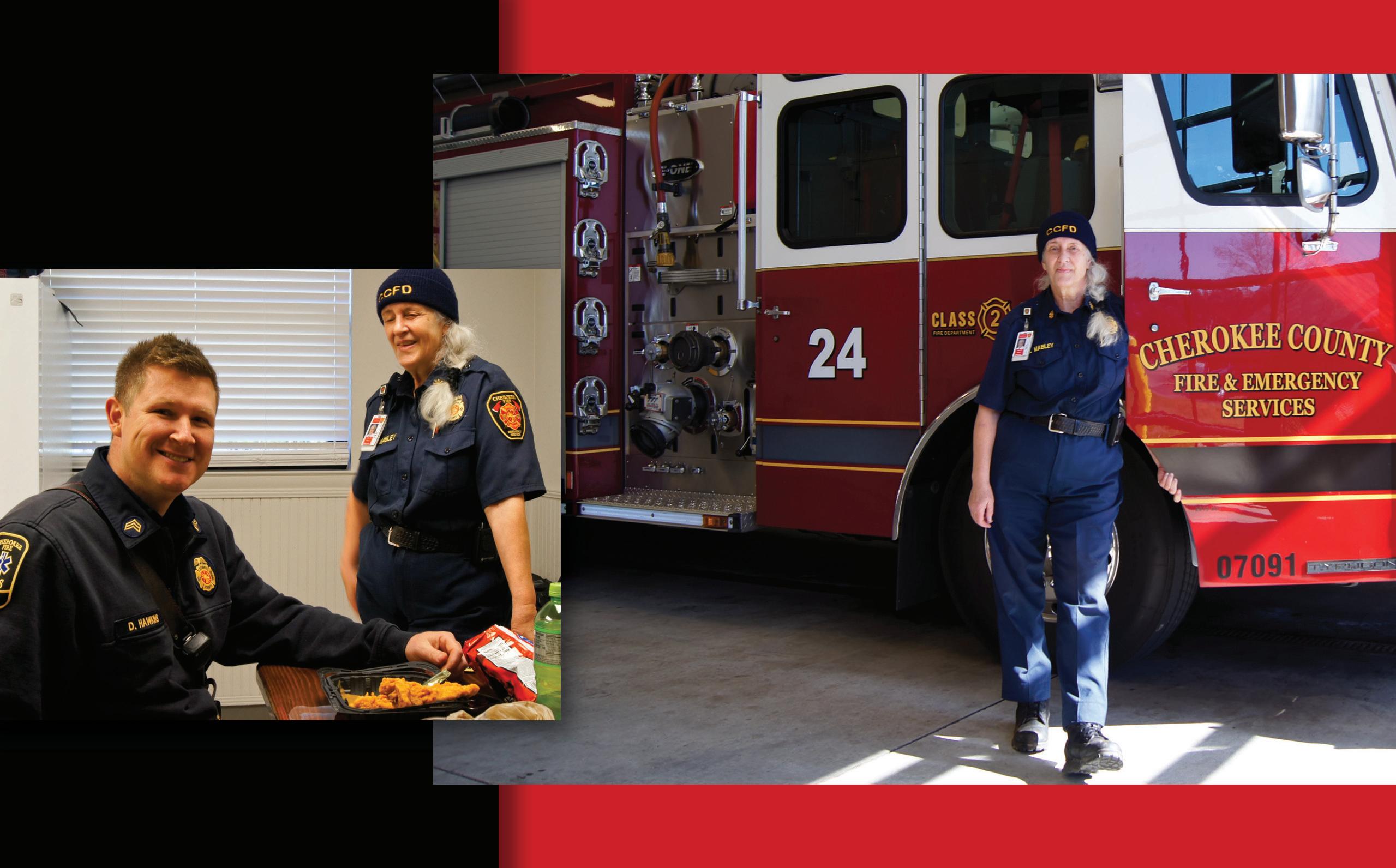
4 minute read
Dr. Jill Mabley Breaks the Glass Ceiling
Strong. Indomitable. Fearless. Frontrunner.
What image do these words evoke? A soldier? A civil rights activist?

You probably wouldn’t picture a slender, lovely woman in her seventies, but Dr. Jill Mabley, the medical director for Cherokee County Fire and Emergency Services, embodies all these traits and more.
The résumé of Dr. Jill Mabley may seem extraordinary—doctor, firefighter, chief emergency room doctor, deputy emergency medical services medical director of Georgia— but even those jobs don’t mention her most impressive qualifications. Jill not only broke through the glass ceiling, she shattered it. She even redefined what it means to be a first responder.

Did you know that our fire stations are open to the public? Of course, citizens need to be respectful, but the squads are always ready to serve as a tour guide.
Photo Credit: Jodi Drinkard
Jill grew up in Chicago and in a small town in rural Wisconsin. The daughter of a legendary journalist with the Chicago Tribune, she says, “My parents taught me that I could do anything I wanted to do. I wanted to test limits.”
Such an attitude was unusual for parents in the 1950s, when girls were expected to become wives and mothers, period. Even the women who did get an education were rarely given the tools to succeed and had few career options. Jill attended Cornell University and received a degree in history, for example.

It's amazing how much respect, honor, and appreciation each of the public safety officers have for Dr. Mabley. She is truly a mentor to the team.
Photo Credit: Jodi Drinkard
Job opportunities for women were thin, and Jill knew she had to make her own future. She moved to Chicago and worked at the Art Institute as a librarian in the children’s section while taking science classes at the University of Illinois. The sciences appealed to her, so she applied for the medical program at Rush University, one of only ten women in the program of 120 students.

Bill Fincher. Dependable. Lower Taxes. Conservative.
Paid for by Bill Fincher for State House.
Upon graduation Mabley specialized in emergency medicine, a fledgling career path for doctors, but Jill notes, “My parents emphasized volunteer work and giving back. It was part of my DNA.” Emergency room doctors got disrespected in the beginning, she recalls. “We were called glorified paramedics.”
With the exception of the University of California San Francisco, hospitals had no major emergency and trauma centers in the early 1970s. Always a trailblazer, Jill took her training and formidable intellect to San Francisco, where she worked at the new emergency center. While the job fulfilled her need for intellectual stimuli and satisfied her charitable nature, it did not satisfy her wanderlust.
Jill left northern California and traveled throughout the United States. For a decade she worked as a medic for the ski patrol in Jackson Hole, Wyoming, as well as an emergency room doctor. She then participated in medical missions, working in the oil fields. She was the first female physician to be recruited to work at the hospital in Riyadh, Saudi Arabia. When she decided to settle down in 1997, she moved to Georgia to be closer to family.
Jill worked for the State of Georgia on the State EMS Medical Directors Advisory Council and was the deputy EMS medical director for the state. The job wasn’t quite where she fit, though, she says. “After nine-eleven, I felt like I had a calling, and that calling was public safety.”
A decade ago Cherokee County had a disparate team of firefighters, with the various cities and the county fighting it out for training and resources. The county used contract ambulance and emergency services. The good doctor didn’t see the conflict as insurmountable; after all, she had been breaking through barriers since she was a young woman. Jill approached Robby Westbrook, the fire chief in Cherokee County at the time, about her plan to begin an elite training program for county firefighters. She and Westbrook forged a new path for firefighters in Cherokee County, and in 2003 Cherokee County Fire and Emergency Services was born.

Dr. Jill, with the support of Westbrook and the county commissioners, set about reinventing Cherokee County Fire. She set up new protocols. Under her guidance all firefighters are now cross-trained as emergency medical technicians and must complete four months of grueling medical training. She is working to get her team accredited at the national level. She was instrumental in implementing the use of Narcan to revive drug-overdose patients and ensured that all first responders were properly trained in its use. Still out in the field as often as possible, Jill interacts with medical control—telephone or radio consultation between EMS providers and physicians to guide and provide patient care. She talks with her teams constantly, ensuring the protocols she set in place are effective and reworking problematic ones. She has made Cherokee County Fire and Emergency Service a motivated, fully integrated unit.
Dr. Jill Mabley has spent her life-transforming the world. A pioneer in emergency medicine, she dominated in traditionally male careers. She set the standard for training firefighters, not only in Cherokee County but throughout the state. A groundbreaker, she overturned gender roles, but most importantly, she illustrates all that a firefighter and first responder could and should be.
“Rosie the Riveter” is America’s first lady of equal opportunity for women. Join us as we celebrate some Cherokee County women who are making a difference.



